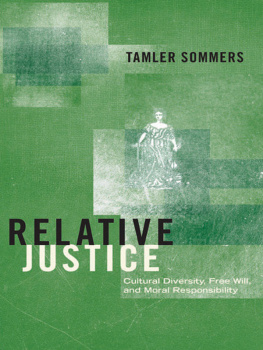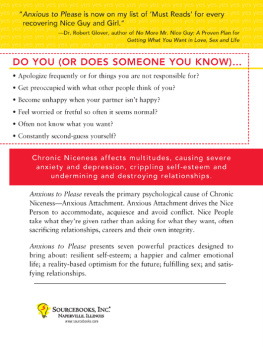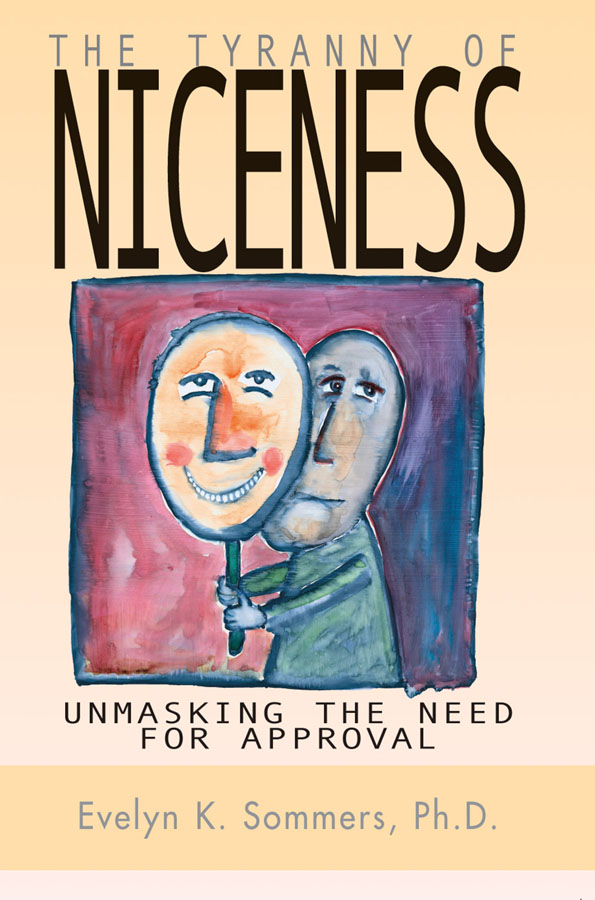THE TYRANNY OF
NICENESS
To Katherine V. Sommers
THE
TYRANNY
OF
NICENESS
UNMASKING THE NEED FOR APPROVAL
by Evelyn K. Sommers, Ph.D.

Copyright Evelyn K. Sommers, 2005
All rights reserved. No part of this publication may be reproduced, stored in a retrieval system, or transmitted in any form or by any means, electronic, mechanical, photocopying, recording, or otherwise (except for brief passages for purposes of review) without the prior permission of Dundurn Press. Permission to photocopy should be requested from Access Copyright.
Excerpt from Cats Eye by Margaret Atwood (page 76), O. W. Toad Ltd. Used by permission of the author.
Copy-Editor: Jennifer Gallant
Design: Andrew Roberts
Printer: Webcom
Library and Archives Canada Cataloguing in Publication
Sommers, Evelyn K. (Evelyn Kathleen)
The tyranny of niceness : unmasking the need for approval /
Evelyn K. Sommers.
ISBN-10: 1-55002-558-9
ISBN-13: 978-1-55002-558-3
1. Self-actualization (Psychology) 2. Social acceptance. I.Title.
BF637.S4S655 2005 158.1 C2005-901764-3

We acknowledge the support of the Canada Council for the Arts and the Ontario Arts Council for our publishing program. We also acknowledge the financial support of the Government of Canada through the Book Publishing Industry Development Program and The Association for the Export of Canadian Books, and the Government of Ontario through the Ontario Book Publishers Tax Credit program, and the Ontario Media Development Corporation.
Care has been taken to trace the ownership of copyright material used in this book. The author and the publisher welcome any information enabling them to rectify any references or credit in subsequent editions.
J. Kirk Howard, President
Printed and bound in Canada.
Printed on recycled paper.
www.dundurn.com
Dundurn Press
8 Market Street, Suite 200
Toronto, Ontario, Canada
M5E 1M6
Gazelle Book Services Limited
White Cross Mills
Hightown, Lancaster, England
LA1 4X5
Dundurn Press
2250 Military Road
Tonawanda NY
U.S.A. 14150
THE TYRANNY OF
NICENESS
CONTENTS
ACKNOWLEDGMENTS
It has been my good fortune to have many people in my life who have helped bring this book to fruition. All have been important in their own ways, whether they have provided emotional support, critical feedback, enthusiasm for my ideas, or hands-on editing. Family, friends, and associates have contributed to the production of this book. They have encouraged me in direct and indirect ways, often when they said you must have written it about me! when I shared my ideas with them. These moments have been galvanizing for me, reinforcing again and again the relevance of the topic.
To my clients I say a special thank you. I am grateful to all who gave permission to include their stories, and to others who provided me with a reason for writing this book as they engaged in their individual struggles with niceness.
There are several more people whom I wish to thank by name.
For their continuing support and love, and for reading and commenting on the manuscript, I thank family members Lauren Shuster, Bobbie Sommers, and my mother, Katherine Sommers. My son, Adam Revesz, gave all of the above and also listened to my evolving ideas, dialoguing with me throughout the process, from its beginning to conclusion. Wendy McNamara and Jennifer Bamberry-Sommers have been enthusiastic supporters.
For their influence on this project, especially in its beginning stages, I thank Cindy Stone for her belief in the importance of the topic and her feedback and M.T. Kelly for suggesting I should be writing a book, not an essay. To Tom Allan, I am grateful for his affirming response to my ideas with the phrase tyranny of niceness. Margaret Malone, Bruce Etches, Joanna Holt, and Carole Anne Armstrong have been encouraging presences and sounding boards.
Thank you to Joanne Duma and Dave Graham for their careful reading and thoughtful comments on the entire manuscript and to Paula Caplan, Sam Minsky, and Astrid Stec for feedback on parts of the manuscript at different stages along the way.
Thank you to Tony Hawke of The Dundurn Group for his enthusiastic response to the ideas and to Jennifer Gallant for her careful copyediting.
Finally, I am especially grateful to Larry Hoffman: He has been steadfast in his belief in the book and in my ability to write it, and he helped me define the kind of book I was writing a clarity I needed in order to continue to completion. He enriched the text with his knowledge of history, lent his skills as a researcher and editor, and found a publisher. His energy and enthusiasm have been contagious. When I was struck with critical illness at one stage of the writing, he helped manage the details of my life, kept my spirits up, and took care of my dog and her puppies. He always believed I would survive and that the book would become a reality. His emotional support has been fortifying and inspiring.
INTRODUCTION
I was crossing the street in a small town one day, walking towards the entrance to a restaurant. A lone man was standing in front of the restaurant, between me and the door but at least five feet away from it. There was plenty of room for me to pass by him. Nonetheless, as I approached the area where he stood, he stepped away and said Sorry as I passed by. I cannot imagine why he was sorry unless he judged from my facial expression or demeanour that I was suffering in some way because of something he had done. There were at least three body widths between us and he had not been blocking my path. He was being neither unpleasant nor threatening, nor was he disturbing me in any way, so he had no reason to excuse himself. Yet this nice man not only moved but also apologized as he did so. If he had been unpleasant, blocked my way, or called me names I would have wished for him to be nice, but that was not the case. The man apologized simply for being there.
You may find yourself behaving in just the same way from time to time. Perhaps you are the one who apologizes to the person who steps backward onto your toes in the checkout line. Even though your apology leaves you feeling a bit uncomfortable, you think no more about it, except that you recognize yourself as someone who says Im sorry far too often.
Fifteen years of hearing stories, in my practice of psychotherapy and counselling, from clients who have struggled with their own niceness have convinced me that being nice is not always a good thing, nor is it harmless or something to ignore. On the contrary, it is a troubling and complex phenomenon with a variety of implications. To be nice means to silence ourselves in some way, and in doing so, we compromise our authenticity and give up freedom to act and speak. On the other hand, niceness may facilitate the shedding of responsibility. When we teach children to be nice we may put them at risk. Trusting others who are nice, or appear to be nice, may not always be in our best interests.
This book is an exploration of what it means when we are being nice. My starting point was my own experience of niceness, inspired by my own disappointments, regrets for those times that I did not act and speak authentically, and some stories that I wanted to tell. I have drawn from case examples and everyday observations, all of which have been disguised to respect the privacy of the people involved. Some of the case examples are composites of stories I have heard from many people, although most are actual cases.











